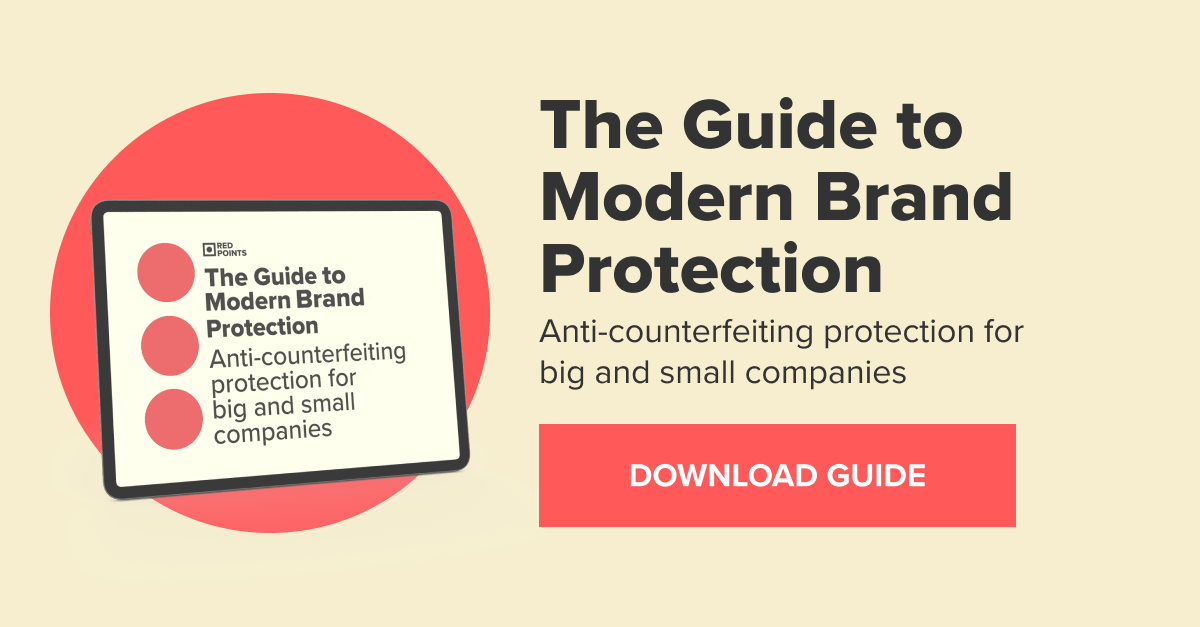If we mention counterfeiting, it’s likely that you think of a B2C environment — and that makes sense. It’s common for a B2C sale to be a one-off event, with the buyer never returning to the seller. It’s also common for a B2C buyer to be sufficiently uninformed that they never realize they bought a fake (or realize too late to do anything about it).
But what of the B2B world? The average sale is a very different beast, after all, with much more focus on customer retention. Given that distinction, do B2B companies even need to care about sellers hawking counterfeit versions of their products? To skip ahead, the answer is yes — they need to protect their brands — but first, allow me to explain why.
Summary
- Having your brand name stamped on a poor-quality product is bad news for your reputation.
- Counterfeiting can drive the price of B2B products down.
- B2B sales happen more and more frequently online, enabling the sale of fakes.
- Digital piracy is an especially big risk for B2B companies.
Counterfeit quality affects brand perception
Suppose that you ran a B2B business providing offices with high-quality furniture, but an unscrupulous seller decided to take advantage of your brand reputation and start offering a cut-price version of your main products (complete with copied brand tags making them much more convincing than sloppy B2C counterfeit items). Subsequently, an office manager with a small budget and limited time took them up on that offer to bring in a range of desks and chairs.
Now imagine that a prospective client visited said office, had a thoroughly uncomfortable time using that range of products and looked at the branding to make note of the company that had caused them so much inconvenience. They wouldn’t have any reason to suspect illegitimacy, and they’d leave with a negative perception of your brand.
It wouldn’t matter that you hadn’t been involved in the process. That negative view would linger, and they might even pass it to their friends and colleagues, advising them to avoid your brand. Unfortunately, simply having counterfeit products out in the world poses a threat in this way.
Perceived abundancy can devalue products
It’s common for top brands to lean heavily on artificial scarcity. They have the resources and ability to offer their products in far greater numbers, but they don’t — they know that keeping the availability down helps to make demand outstrip supply, which pushes the market value up.
There’s nothing wrong with this, but counterfeiters can turn it into a liability. When a raft of counterfeit products hits the market, it can cause one (or both) of the following inconveniences:
- It can expose the artificial scarcity, attracting scorn (however unreasonable). If one of your selling points concerns the materials you use, a counterfeiter can use the same materials, making people wonder why you don’t release more stock — totally disregarding your other selling points, and forgetting that you’re not obliged to scale.
- It can make your products seem abundant, lowering their perceived value. This is the main issue, particularly if your products are practical in nature. If fraudulent sellers flood the market with counterfeit versions of your products, prospective buyers won’t be able to identify all the fakes, and they’ll be led to believe that your products are common.
In short, the more you can do to keep counterfeit products off the market, the better you’ll be able to preserve the perceived value of your legitimate products.
Ecommerce enables elaborate deceptions
When the B2C world started to move online, it presented a lot of difficulties for sellers (and buyers) invested in showing product legitimacy. Anything but a high-quality counterfeit is readily apparent when inspected in person, but when listed online, it can be made to look exactly like the real thing — it’s just a matter of stealing all the brand product materials and trust indicators.
The B2B world took longer to shift because there’s a strong tradition of B2B deals being arranged in person, but it happened in the end. After all, 93% of B2B shoppers prefer to buy online at this point, and there’s no sense in fighting the market. Consequently, B2B sellers operating online must contend with how easily their listings can be copied.
Think of how frustrating online marketplaces can be when it comes to finding legitimate products. While there are some safeguards in place, it’s perfectly possible for a seller to list its counterfeits as legitimate items and simply hope to make some sales before anyone notices.
B2B products are comparatively important
Temporarily disregard everything we’ve looked at so far, and answer this: how much does it matter if someone buys a Gucci bag? From the buyer’s standpoint, it might not make too much difference. It likely won’t prove as durable or look quite as good, but it’s acceptable provided it functions as a serviceable bag.
But this can’t be said for many B2B products because they tend to be quite important from a functional standpoint. This is due to the scale of implementation as well as product types. If you install a new set of locks across your business properties, then discover that there’s something wrong with the design, that’s a major security liability — and if your manufacturing safety equipment fails, someone could be grievously injured.
Consider the potential ramifications of someone dying in the workplace due to the failure of a counterfeit version of one of your products. Your fault? No, certainly not. But it would lead people to ask questions. Was it a bad copy, or does your product have a design flaw? Such questions would plague you, making businesses think twice before buying from you.
Digital piracy is doubly negative
Of course, it isn’t only physical products that are subject to counterfeiting. Digital piracy is a persistent threat to software developers in the B2B world because it’s so easy to download or install pirated software — and there’s no shortage of people out there willing to spend time cracking protected software to make it usable for free.
And while piracy could potentially be viewed as a net positive in rare situations (someone pirating a game to try it before buying it), those situations mostly don’t bleed through to B2B developers. It mainly just loses sales. The only positive that can be found is that pirated software can yield exposure, but there’s a major issue here: counterfeit software is often modified.
The modifications typically involve adding keyloggers and other utilities to spy on the users and possibly steal their personal data — utilities that can slow things down and cause instabilities in addition to their intended consequences. And even if counterfeit software isn’t modified aside from being cracked, it will lack support and regular updates, making the software look worse to the unknowing observer.
For all of the above reasons and many more, B2B companies certainly do need to care about counterfeits. If they won’t take action to protect their brands, they’ll see them irrevocably tarnished by the actions of sellers just out to make some quick money.






